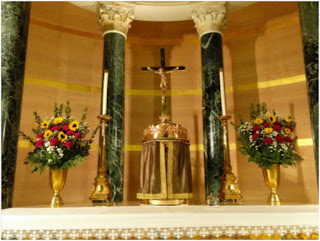Saint Augustine: Sacra Theologia -"Sacred Theology"
St. Augustine of Hippo, Bishop,
Confessor, Doctor of the Church
Feast Day: August 28
St. Augustine is known for many
great works in apologetics, exegetics, sermons, letters and treatises. His most
well-known works are City of God, On the Trinity, and
of course, his Confessions, which
gives a personal testimony of his life of conversion. One particularly striking passage from his Confessions is presented for us in the
Office of Readings on August 28:
Late have I loved you, O Beauty ever ancient, ever new, late have
I loved you! You were within me, but I was outside, and it was there that I
searched for you. In my unloveliness I plunged into the lovely things which you
created. You were with me, but I was not with you. Created things kept me from
you; yet if they had not been in you they would not have been at all. You
called, you shouted, and you broke through my deafness. You flashed, you shone,
and you dispelled my blindness. You breathed your fragrance on me; I drew in
breath and now I pant for you. I have tasted you, now I hunger and thirst for
more. You touched me, and I burned for your peace.[1]
 St. Augustine presents to us a
life of philosophical and theological thought that is centered on Christ,
centered on prayer, and not simply an academic exercise. He has a saying, Crede, ut intelligas (“believe, so that
you may understand”), on the relationship between belief and reason; we must not
seek understanding to believe, but believe in order to understand.[2]
Faith precedes reason in the sense that it gives access to these things. This
is similar to the famous formulation of St. Anselm, fides quaerens intellectum, or “faith seeking understanding.” The
intellectual pursuit of philosophy and theology centered on this principle is
one where the center point is faith in God, and study flows from the believer’s
desire to come to know Him more deeply.
St. Augustine presents to us a
life of philosophical and theological thought that is centered on Christ,
centered on prayer, and not simply an academic exercise. He has a saying, Crede, ut intelligas (“believe, so that
you may understand”), on the relationship between belief and reason; we must not
seek understanding to believe, but believe in order to understand.[2]
Faith precedes reason in the sense that it gives access to these things. This
is similar to the famous formulation of St. Anselm, fides quaerens intellectum, or “faith seeking understanding.” The
intellectual pursuit of philosophy and theology centered on this principle is
one where the center point is faith in God, and study flows from the believer’s
desire to come to know Him more deeply.
Liturgically, this is expressed
in the Collect at Mass on Augustine’s feast day:
Renew in your Church, we pray, O Lord,
the spirit with which you endowed
your Bishop Saint Augustine
that, filled with the same spirit,
we may thirst for you,
the sole fount of true wisdom,
and seek you, the author of heavenly love.
Through our Lord Jesus Christ, your Son…[3]
In artwork, St. Augustine is
often shown holding a book, as well as depicted wearing the pontificals of a
bishop: wearing a miter and pallium, holding a crozier. As a Doctor of the
Church, he holds a book inscribed with the symbol IHS, an abbreviation for the
name of Jesus Christ (a Christogram) from the first three letters of the
Latinized Greek spelling of his Holy Name. On each of the side panels, in the
background behind the angels, we see architectural references to the seminary
chapel. Perhaps this gives pause for reflection on the proper orientation of
the student of theology. The chapel is a place of prayer, the place of the
personal encounter with our Lord, on which the rest of our activities rest. The
story of Augustine’s life, and this depiction of him, show us that our
theological studies are not directed by the lures of this world, and that they
do not stem from any other subject area. Theological studies, and ultimately,
our lives as believing Christians, are oriented by Christ, and rest only in
God.
(*A brief note about the location
of this triptych: This artwork currently hangs in the choir rehearsal room,
although its original location was above one of the apsidal altars behind the
main seminary chapel. Until a time when it can be restored to its first place,
it serves as a gentle reminder to those who sing. Not only did he pen a
significant treatise on the metaphysics of music, but his theological writing
leads us to a deeper understanding of why we sing. Oft-quoted is this adage by
St. Augustine: Cantare amantis est. “Singing
belongs to the one who loves,” or, “the one who loves, sings.” [4]Rehearsing
and paying attention to little details, especially theology expressed in music,
is an expression of love: the love of the eternal Beauty. How fitting it is that
St. Augustine reminds us of this daily.)
Written by Alexis Kutarna (Music director for St. Mary's Seminary)




Comments
Post a Comment